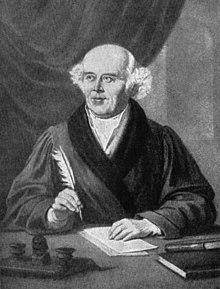Homoeopathy
| Alternative medicine | |
|---|---|

Samuel Hahnemann, originator of homeopathy
|
|
| Claims | "Like cures like", dilution increases potency, disease caused by miasms. |
| Related fields | Alternative medicine |
| Year proposed | 1796 |
| Original proponents | Samuel Hahnemann |
| Subsequent proponents | James Tyler Kent, Constantine Hering, Royal S. Copeland, George Vithoulkas |
| MeSH | D006705 |
| See also | Humorism, heroic medicine |
Homeopathy (![]() i/ˌhoʊmiˈɒpəθi/) or homoeopathy is a system of alternative medicine created in 1796 by Samuel Hahnemann, based on his doctrine of like cures like (similia similibus curentur), a claim that a substance that causes the symptoms of a disease in healthy people would cure similar symptoms in sick people. Homeopathy is a pseudoscience – a belief that is incorrectly presented as scientific. Homeopathic preparations are not effective for treating any condition; large-scale studies have found homeopathy to be no more effective than a placebo, suggesting that any positive effects that follow treatment are only due to the placebo effect and normal recovery from illness.
i/ˌhoʊmiˈɒpəθi/) or homoeopathy is a system of alternative medicine created in 1796 by Samuel Hahnemann, based on his doctrine of like cures like (similia similibus curentur), a claim that a substance that causes the symptoms of a disease in healthy people would cure similar symptoms in sick people. Homeopathy is a pseudoscience – a belief that is incorrectly presented as scientific. Homeopathic preparations are not effective for treating any condition; large-scale studies have found homeopathy to be no more effective than a placebo, suggesting that any positive effects that follow treatment are only due to the placebo effect and normal recovery from illness.
Hahnemann believed the underlying causes of disease were phenomena that he termed miasms, and that homeopathic preparations addressed these. The preparations are manufactured using a process of homeopathic dilution, in which a chosen substance is repeatedly diluted in alcohol or distilled water, each time with the containing vessel being bashed against an elastic material, (commonly a leather-bound book). Dilution typically continues well past the point where no molecules of the original substance remain. Homeopaths select homeopathics by consulting reference books known as repertories, and by considering the totality of the patient's symptoms, personal traits, physical and psychological state, and life history.
...
Wikipedia
